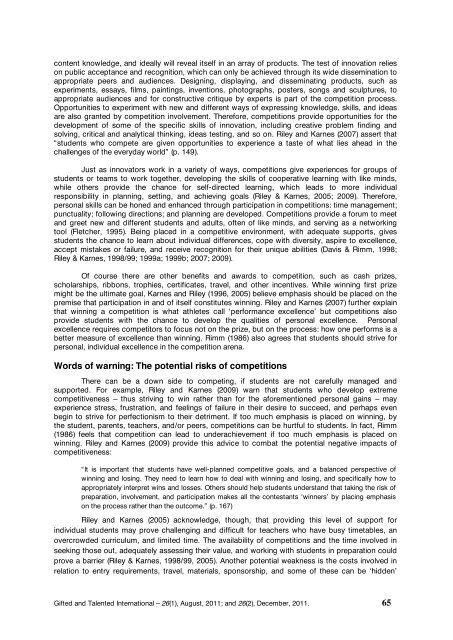The Journal of the World Council for Gifted and Talented Children
The Journal of the World Council for Gifted and Talented Children
The Journal of the World Council for Gifted and Talented Children
You also want an ePaper? Increase the reach of your titles
YUMPU automatically turns print PDFs into web optimized ePapers that Google loves.
content knowledge, <strong>and</strong> ideally will reveal itself in an array <strong>of</strong> products. <strong>The</strong> test <strong>of</strong> innovation relies<br />
on public acceptance <strong>and</strong> recognition, which can only be achieved through its wide dissemination to<br />
appropriate peers <strong>and</strong> audiences. Designing, displaying, <strong>and</strong> disseminating products, such as<br />
experiments, essays, films, paintings, inventions, photographs, posters, songs <strong>and</strong> sculptures, to<br />
appropriate audiences <strong>and</strong> <strong>for</strong> constructive critique by experts is part <strong>of</strong> <strong>the</strong> competition process.<br />
Opportunities to experiment with new <strong>and</strong> different ways <strong>of</strong> expressing knowledge, skills, <strong>and</strong> ideas<br />
are also granted by competition involvement. <strong>The</strong>re<strong>for</strong>e, competitions provide opportunities <strong>for</strong> <strong>the</strong><br />
development <strong>of</strong> some <strong>of</strong> <strong>the</strong> specific skills <strong>of</strong> innovation, including creative problem finding <strong>and</strong><br />
solving, critical <strong>and</strong> analytical thinking, ideas testing, <strong>and</strong> so on. Riley <strong>and</strong> Karnes (2007) assert that<br />
“students who compete are given opportunities to experience a taste <strong>of</strong> what lies ahead in <strong>the</strong><br />
challenges <strong>of</strong> <strong>the</strong> everyday world” (p. 149).<br />
Just as innovators work in a variety <strong>of</strong> ways, competitions give experiences <strong>for</strong> groups <strong>of</strong><br />
students or teams to work toge<strong>the</strong>r, developing <strong>the</strong> skills <strong>of</strong> cooperative learning with like minds,<br />
while o<strong>the</strong>rs provide <strong>the</strong> chance <strong>for</strong> self-directed learning, which leads to more individual<br />
responsibility in planning, setting, <strong>and</strong> achieving goals (Riley & Karnes, 2005; 2009). <strong>The</strong>re<strong>for</strong>e,<br />
personal skills can be honed <strong>and</strong> enhanced through participation in competitions: time management;<br />
punctuality; following directions; <strong>and</strong> planning are developed. Competitions provide a <strong>for</strong>um to meet<br />
<strong>and</strong> greet new <strong>and</strong> different students <strong>and</strong> adults, <strong>of</strong>ten <strong>of</strong> like minds, <strong>and</strong> serving as a networking<br />
tool (Fletcher, 1995). Being placed in a competitive environment, with adequate supports, gives<br />
students <strong>the</strong> chance to learn about individual differences, cope with diversity, aspire to excellence,<br />
accept mistakes or failure, <strong>and</strong> receive recognition <strong>for</strong> <strong>the</strong>ir unique abilities (Davis & Rimm, 1998;<br />
Riley & Karnes, 1998/99; 1999a; 1999b; 2007; 2009).<br />
Of course <strong>the</strong>re are o<strong>the</strong>r benefits <strong>and</strong> awards to competition, such as cash prizes,<br />
scholarships, ribbons, trophies, certificates, travel, <strong>and</strong> o<strong>the</strong>r incentives. While winning first prize<br />
might be <strong>the</strong> ultimate goal, Karnes <strong>and</strong> Riley (1996, 2005) believe emphasis should be placed on <strong>the</strong><br />
premise that participation in <strong>and</strong> <strong>of</strong> itself constitutes winning. Riley <strong>and</strong> Karnes (2007) fur<strong>the</strong>r explain<br />
that winning a competition is what athletes call ‘per<strong>for</strong>mance excellence’ but competitions also<br />
provide students with <strong>the</strong> chance to develop <strong>the</strong> qualities <strong>of</strong> personal excellence. Personal<br />
excellence requires competitors to focus not on <strong>the</strong> prize, but on <strong>the</strong> process: how one per<strong>for</strong>ms is a<br />
better measure <strong>of</strong> excellence than winning. Rimm (1986) also agrees that students should strive <strong>for</strong><br />
personal, individual excellence in <strong>the</strong> competition arena.<br />
Words <strong>of</strong> warning: <strong>The</strong> potential risks <strong>of</strong> competitions<br />
<strong>The</strong>re can be a down side to competing, if students are not carefully managed <strong>and</strong><br />
supported. For example, Riley <strong>and</strong> Karnes (2009) warn that students who develop extreme<br />
competitiveness – thus striving to win ra<strong>the</strong>r than <strong>for</strong> <strong>the</strong> a<strong>for</strong>ementioned personal gains – may<br />
experience stress, frustration, <strong>and</strong> feelings <strong>of</strong> failure in <strong>the</strong>ir desire to succeed, <strong>and</strong> perhaps even<br />
begin to strive <strong>for</strong> perfectionism to <strong>the</strong>ir detriment. If too much emphasis is placed on winning, by<br />
<strong>the</strong> student, parents, teachers, <strong>and</strong>/or peers, competitions can be hurtful to students. In fact, Rimm<br />
(1986) feels that competition can lead to underachievement if too much emphasis is placed on<br />
winning. Riley <strong>and</strong> Karnes (2009) provide this advice to combat <strong>the</strong> potential negative impacts <strong>of</strong><br />
competitiveness:<br />
“It is important that students have well-planned competitive goals, <strong>and</strong> a balanced perspective <strong>of</strong><br />
winning <strong>and</strong> losing. <strong>The</strong>y need to learn how to deal with winning <strong>and</strong> losing, <strong>and</strong> specifically how to<br />
appropriately interpret wins <strong>and</strong> losses. O<strong>the</strong>rs should help students underst<strong>and</strong> that taking <strong>the</strong> risk <strong>of</strong><br />
preparation, involvement, <strong>and</strong> participation makes all <strong>the</strong> contestants ‘winners’ by placing emphasis<br />
on <strong>the</strong> process ra<strong>the</strong>r than <strong>the</strong> outcome.” (p. 167)<br />
Riley <strong>and</strong> Karnes (2005) acknowledge, though, that providing this level <strong>of</strong> support <strong>for</strong><br />
individual students may prove challenging <strong>and</strong> difficult <strong>for</strong> teachers who have busy timetables, an<br />
overcrowded curriculum, <strong>and</strong> limited time. <strong>The</strong> availability <strong>of</strong> competitions <strong>and</strong> <strong>the</strong> time involved in<br />
seeking those out, adequately assessing <strong>the</strong>ir value, <strong>and</strong> working with students in preparation could<br />
prove a barrier (Riley & Karnes, 1998/99, 2005). Ano<strong>the</strong>r potential weakness is <strong>the</strong> costs involved in<br />
relation to entry requirements, travel, materials, sponsorship, <strong>and</strong> some <strong>of</strong> <strong>the</strong>se can be ‘hidden’<br />
<strong>Gifted</strong> <strong>and</strong> <strong>Talented</strong> International – 26(1), August, 2011; <strong>and</strong> 26(2), December, 2011. 65


